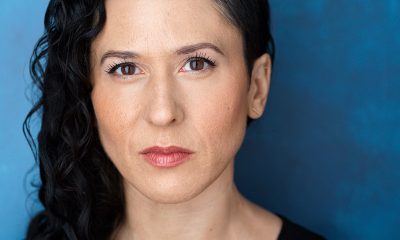Arts & Entertainment
Dueling ‘Othellos’
Synetic brings its trademark moves to its production while Folgers goes traditional route

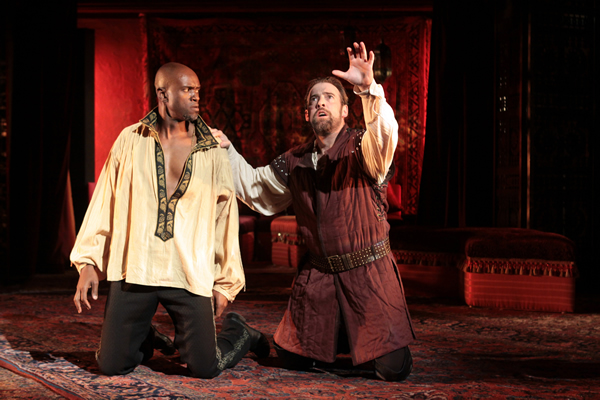
Owiso Odera and Ian Merrill Peakes in the Folger Theatre production. (Photo by Carol Pratt; courtesy of Folger Theatre)
‘Othello’
Through December
Folger Theatre
201 East Capitol Street, SE
$30-$65
202-544-7077
folger.edu‘Othello’
Closes Sunday
Synetic Theater
1800 South Bell Street, Crystal City
$25-$55
800-494-8497
synetictheater.org
Jealousy can be a dangerous emotion. In Shakespeare’s “Othello,” it’s downright lethal. Local audiences can see two vastly different takes on the dark drama at the Folger Theatre on Capitol Hill, and (if you act fast) Synetic Theater in Crystal City.
Director Robert Richmond’s Folger production sets the action during the Crusades and casts Othello as a Templar Knight, underlining the Moor’s unparalleled ascent to power. As Othello, Owiso Odera displays an innate princely confidence and occasional cockiness that works beautifully to further ignite the fury of his secretly sworn enemy Iago, played by a charmingly villainous Ian Merrill Peakes. From the start, the audience is made aware of the extent of Iago’s shocking duplicity and expects him, like most of Shakespeare’s bad guys, to meet his fate at the end of a blade by the end of the evening. Instead he’s sentenced to a smorgasbord of torture.
Despite some hammy moments, Richmond’s “Othello” is an exciting and visceral interpretation. When Odera’s darkly handsome Othello awakens a sleeping Desdemona (the luminous Janie Brookshire) to punish her for alleged sexual misdeeds with her friend Cassio (Thomas Keegan) by strangling her to death (it takes several tries before she eventually dies), it’s intense for sure. And the subsequent scenes in which Iago’s distraught wife Emilia (Karen Peakes) reveals Iago’s ongoing deception and quickly meets a horrific fate, followed by Othello’s devastating realization and a tragic ending of his own, are equally compelling.
This production reunites gay designers William Ivey Long and Tony Cisek who collaborated on last season’s Folger hit “Henry VIII.” Both take brilliant advantage of the tragedy’s disparate regions and climes. As the action moves from Venice via sea to Cyprus, Long’s costumes change from capes, fur-trimmed coats and chain mail to open shirts and sandals. Similarly, Cisek’s dazzling set morphs from a towering canopy bed elaborately crowned in carved wood to magistrate’s office to billowing ship sails to a fabulously appointed Bedouin tent (not entirely Cyprian, but beautiful still).
Synetic’s “Othello” is the second of three revivals featured in the terrific company’s “Speak No More: The Silent Shakespeare Festival.” As the title suggests, the 90-minute show is interpreted solely through movement. And while the uber-fit actors don’t utter a peep about a “green-eyed monster” or “beast with two backs,” all the elements of jealousy and lusty passion are fully conveyed through Paata Tsikurishvili smart staging and Irina Tsikurishvili’s insanely inventive and sexy choreography.
Instead of one of Iago, Synetic has opted to go with three. They’re united when the primary Iago played by a maniacally gleeful Philip Fletcher (who is gay) pulls his two alter egos (Synetic vets Alex Mills and Irina Tsikurishvili) through a Mylar mirror. At times the potent trio overpowers the production’s Othello (Roger Payano), but never for too long. The talented and well built Payano definitely holds his own among a strong cast. In fact, it was Payano who first inspired Synetic to mount “Othello” when it premiered last season.
In ways, the challenge with “Othello” is to buy into Iago’s all-consuming hate for the title character and to believe a man will turn on his beloved wife based on pretty flimsy evidence. Both productions do well convincing on these counts; still, as with so much of Shakespeare, audiences just have to go with it, remembering that jealousy can make people do ugly things.
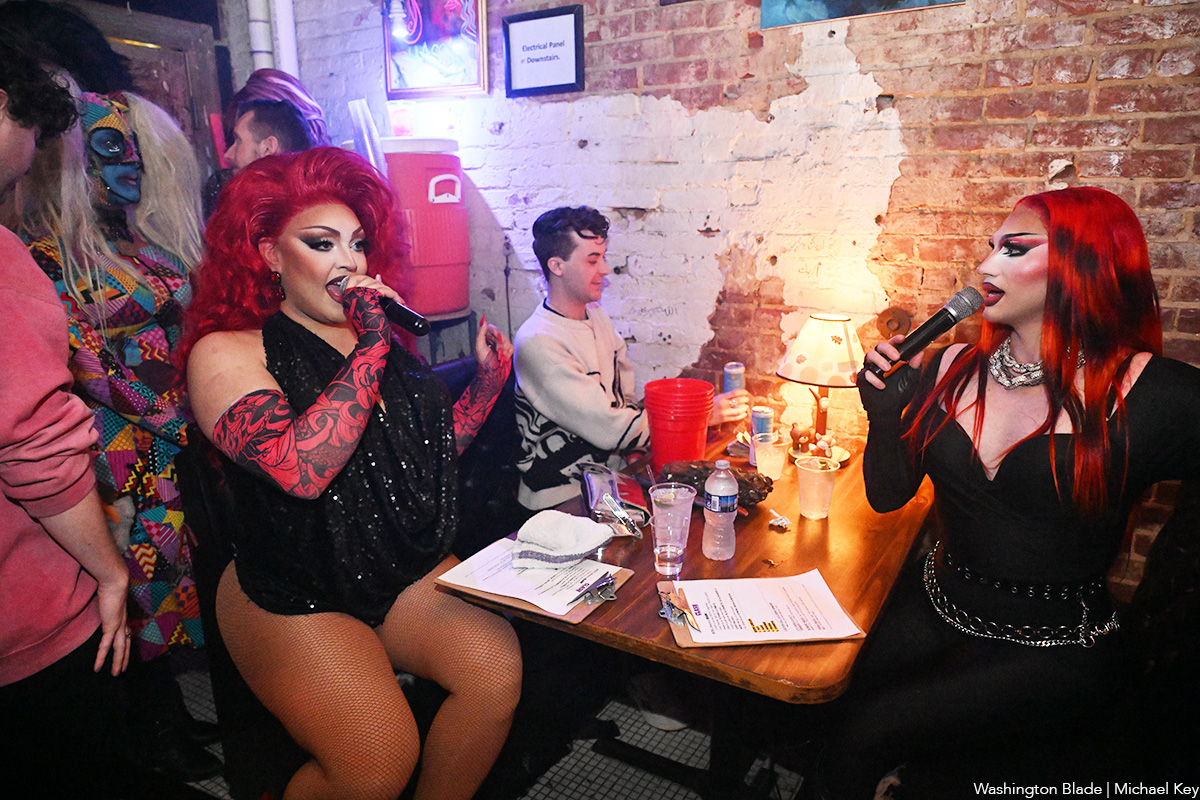
Crimsyn and Tatianna hosted the new weekly drag show Clash at Trade (1410 14th Street, N.W.) on Feb. 14, 2026. Performers included Aave, Crimsyn, Desiree Dik, and Tatianna.
(Washington Blade photos by Michael Key)
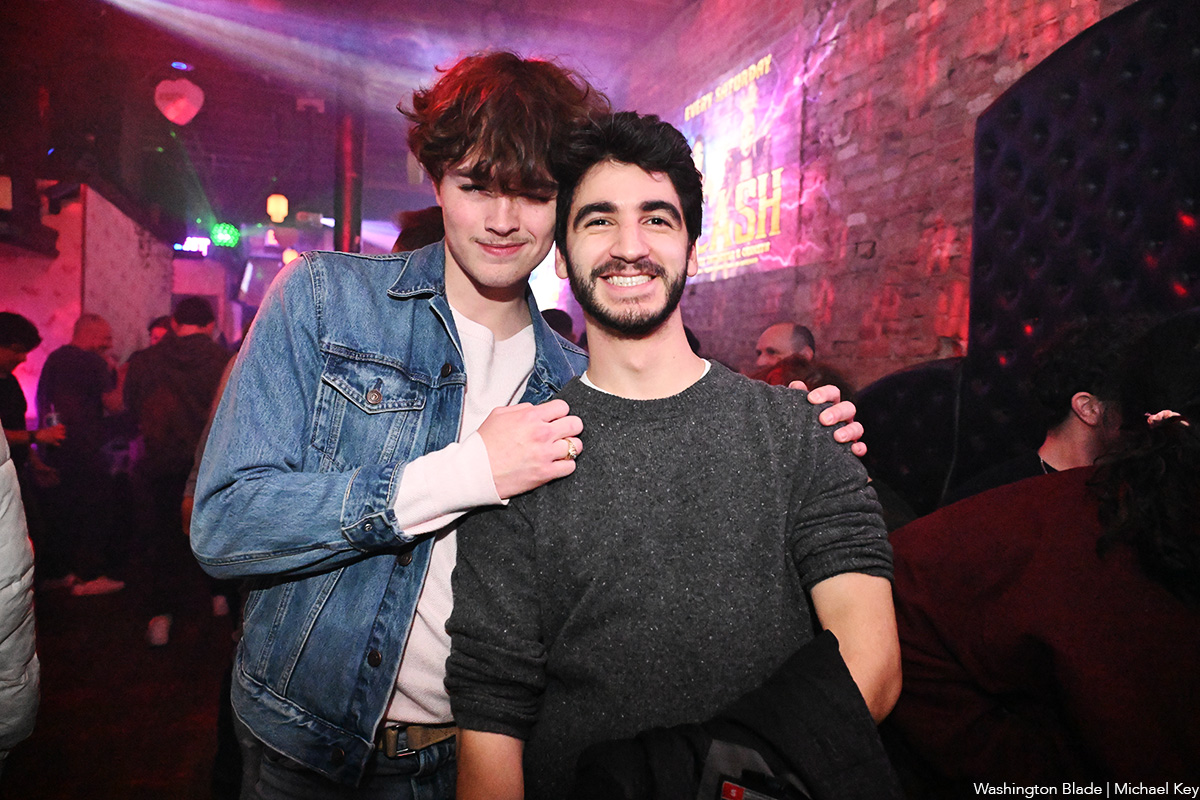
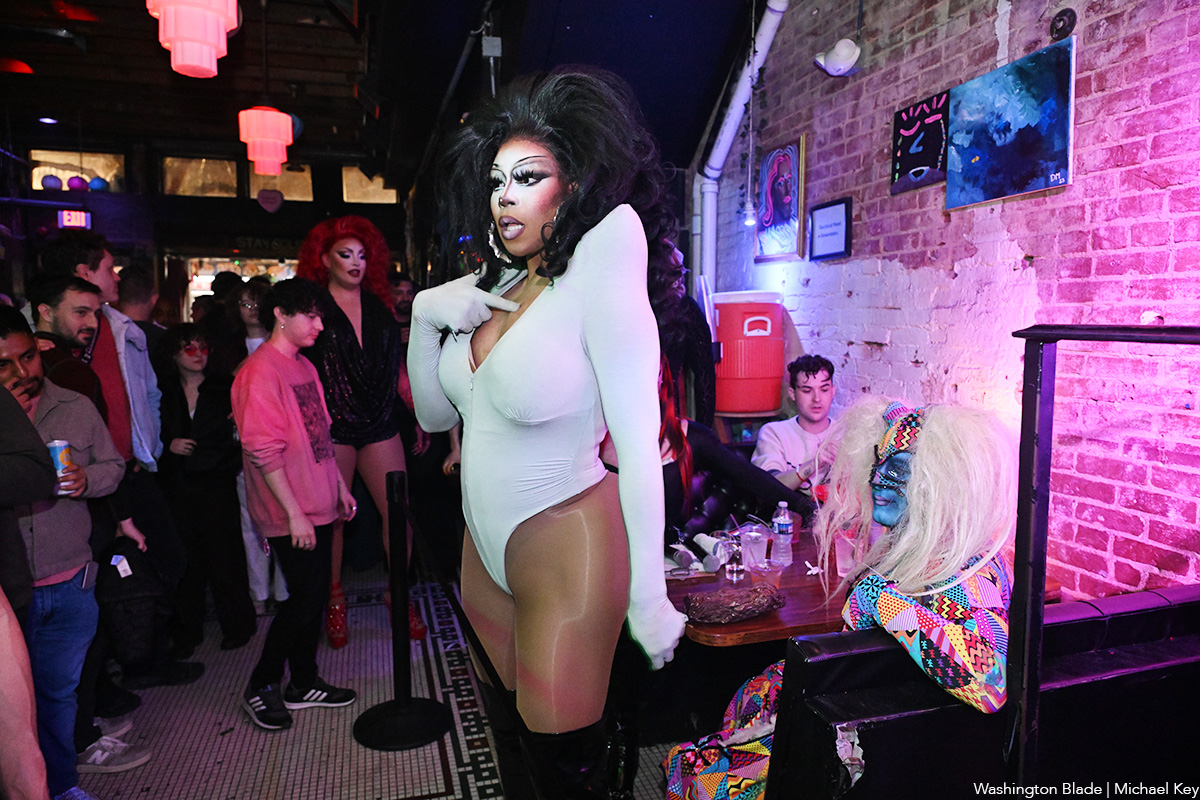
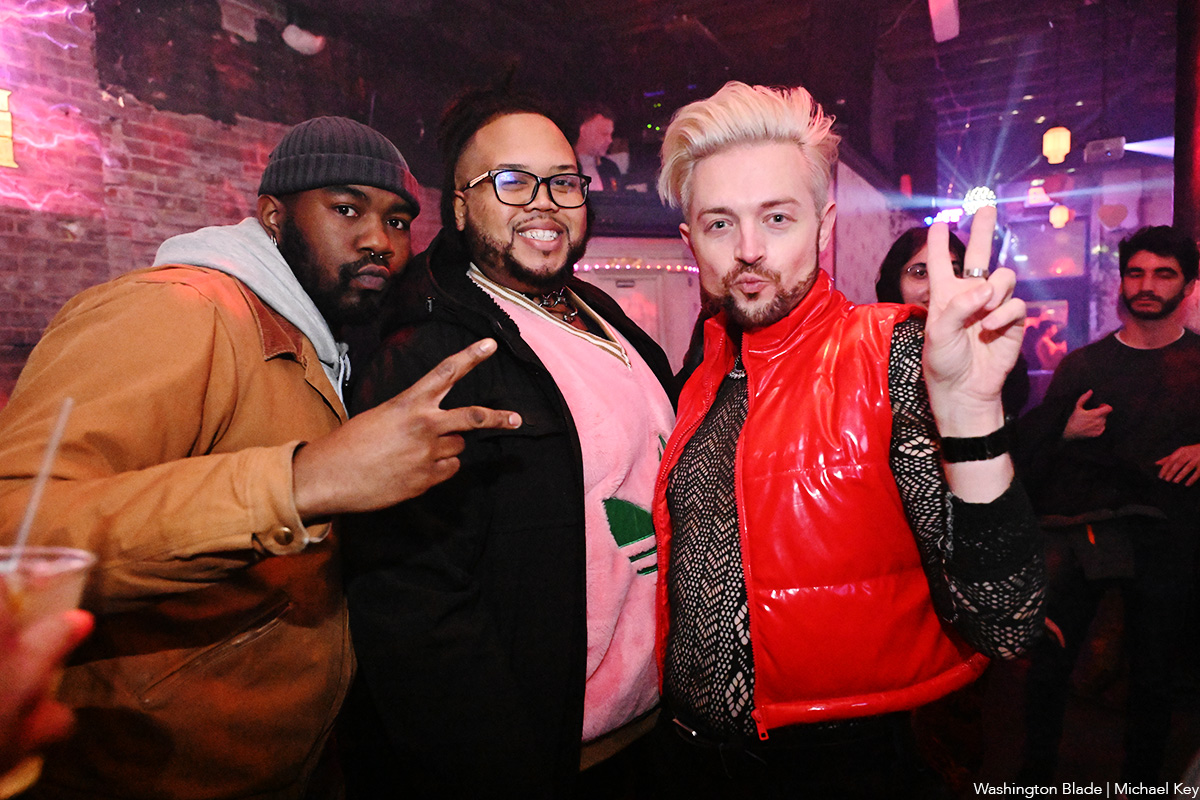
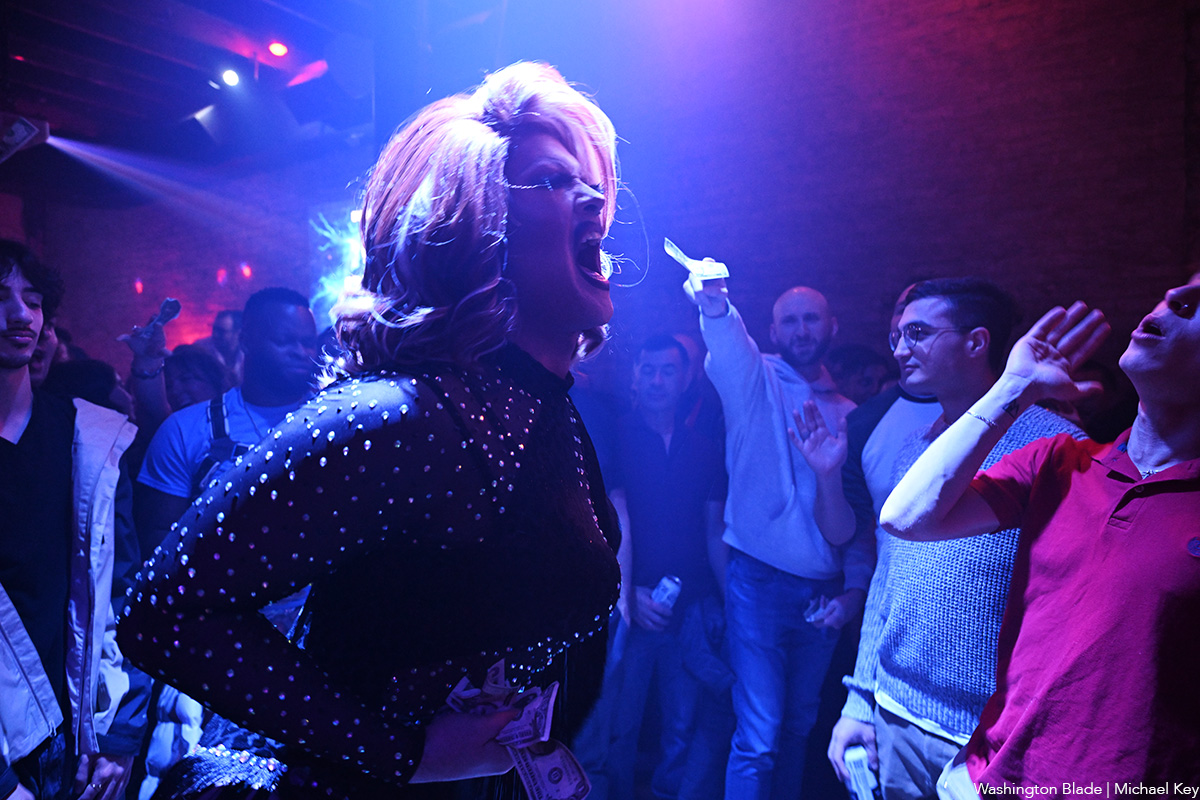

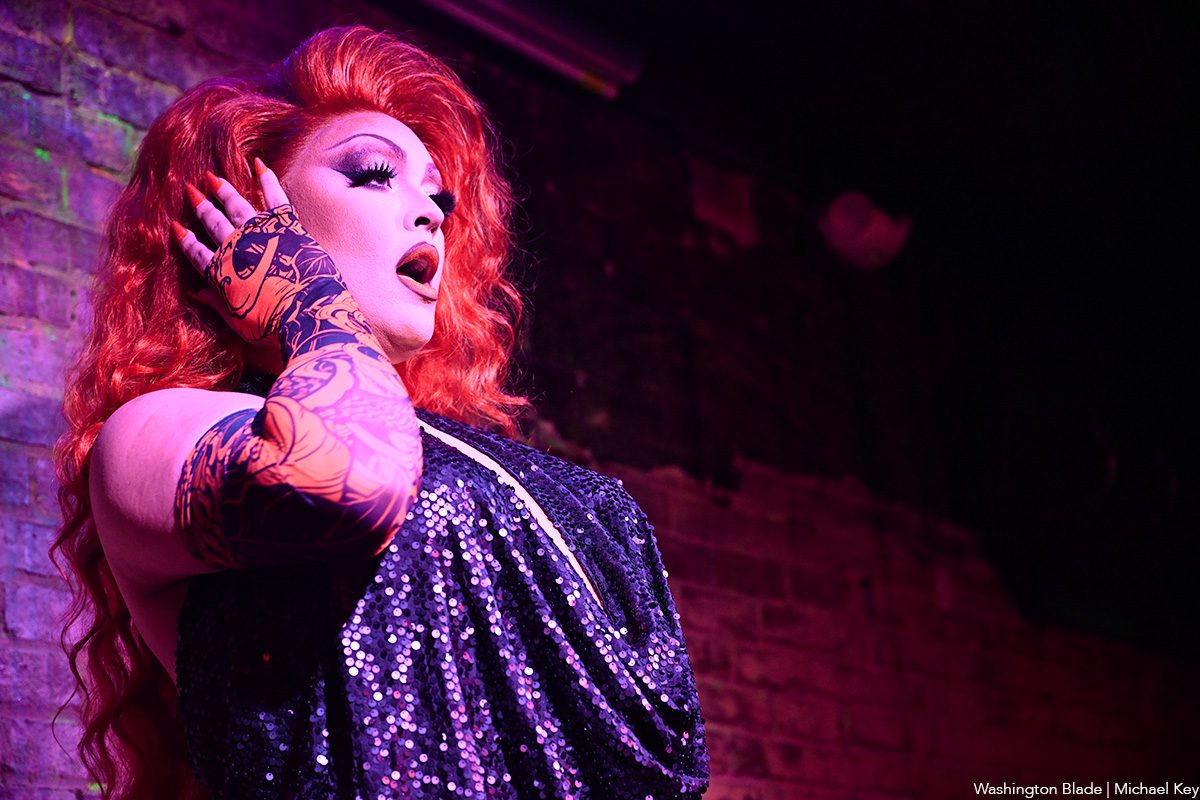
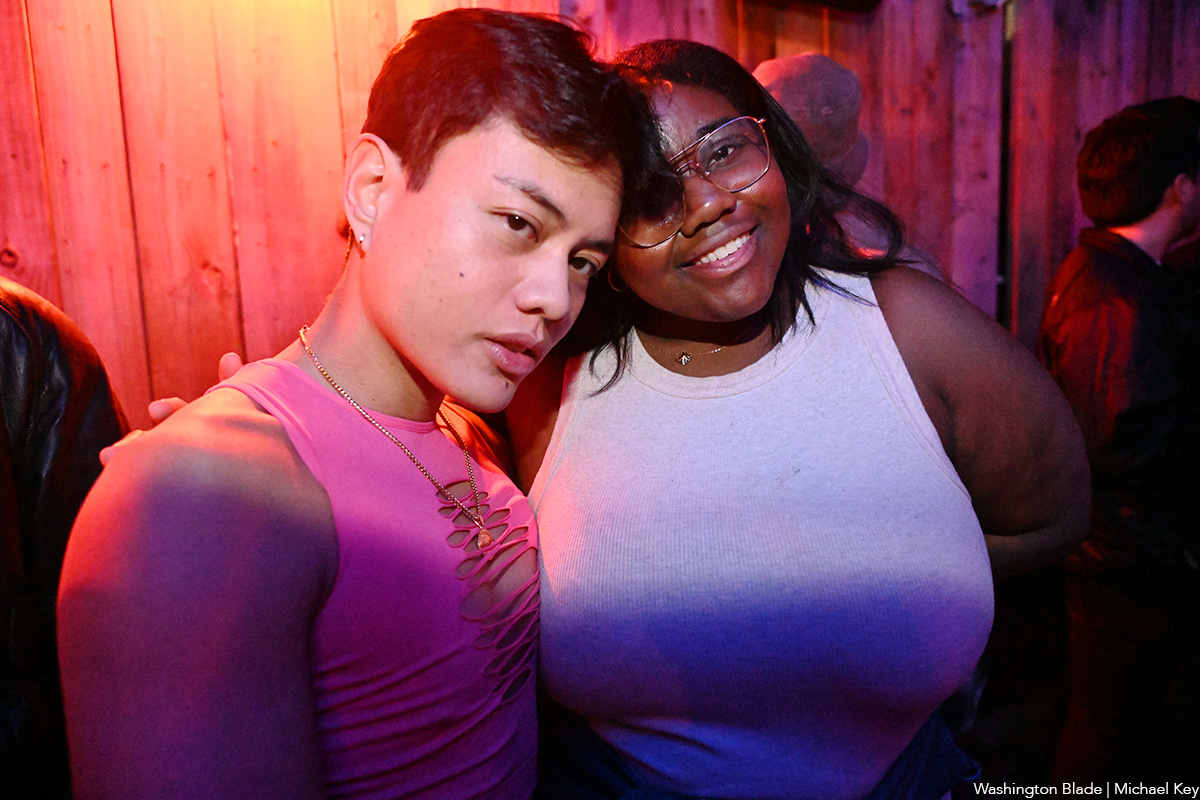
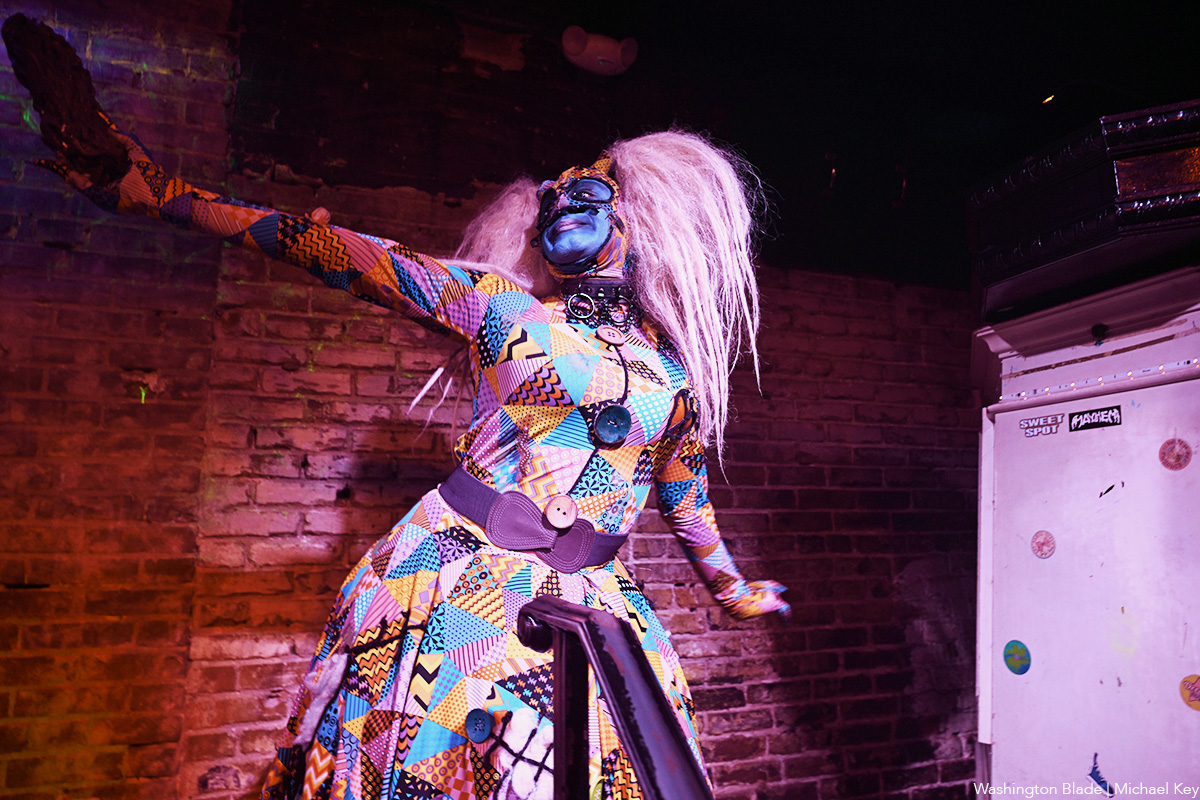
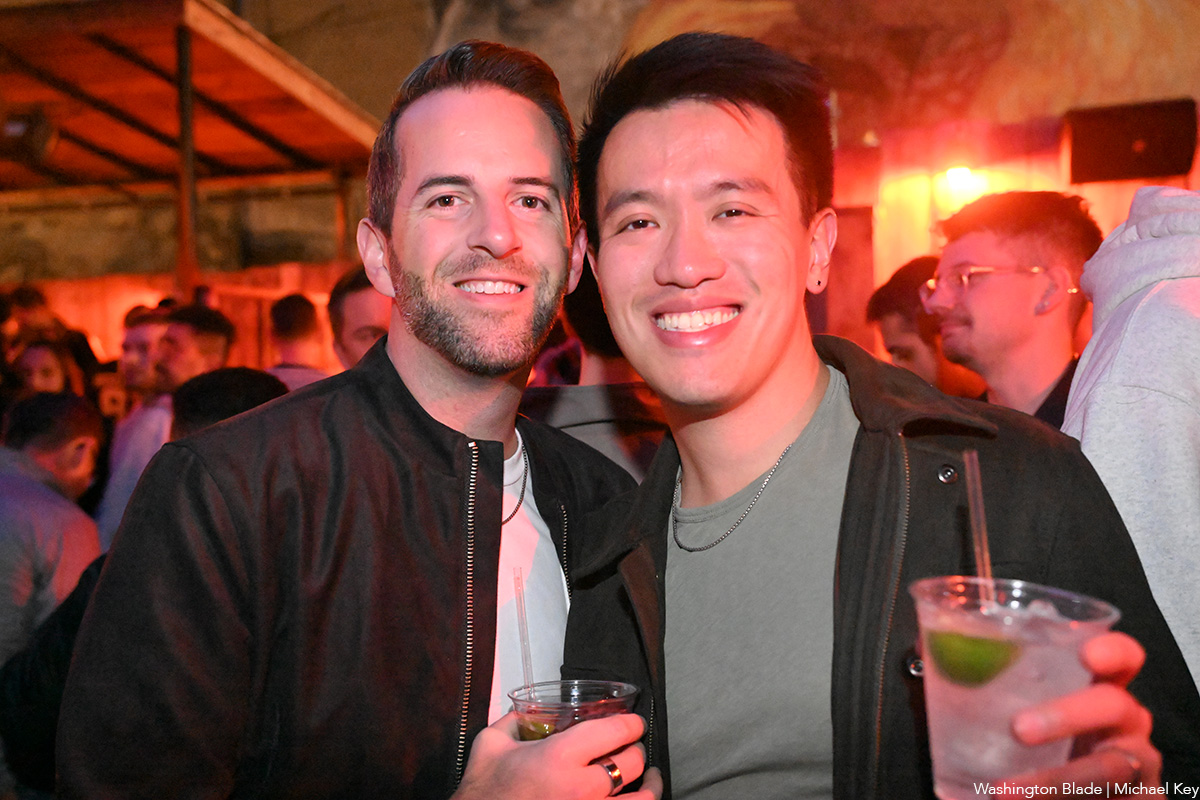
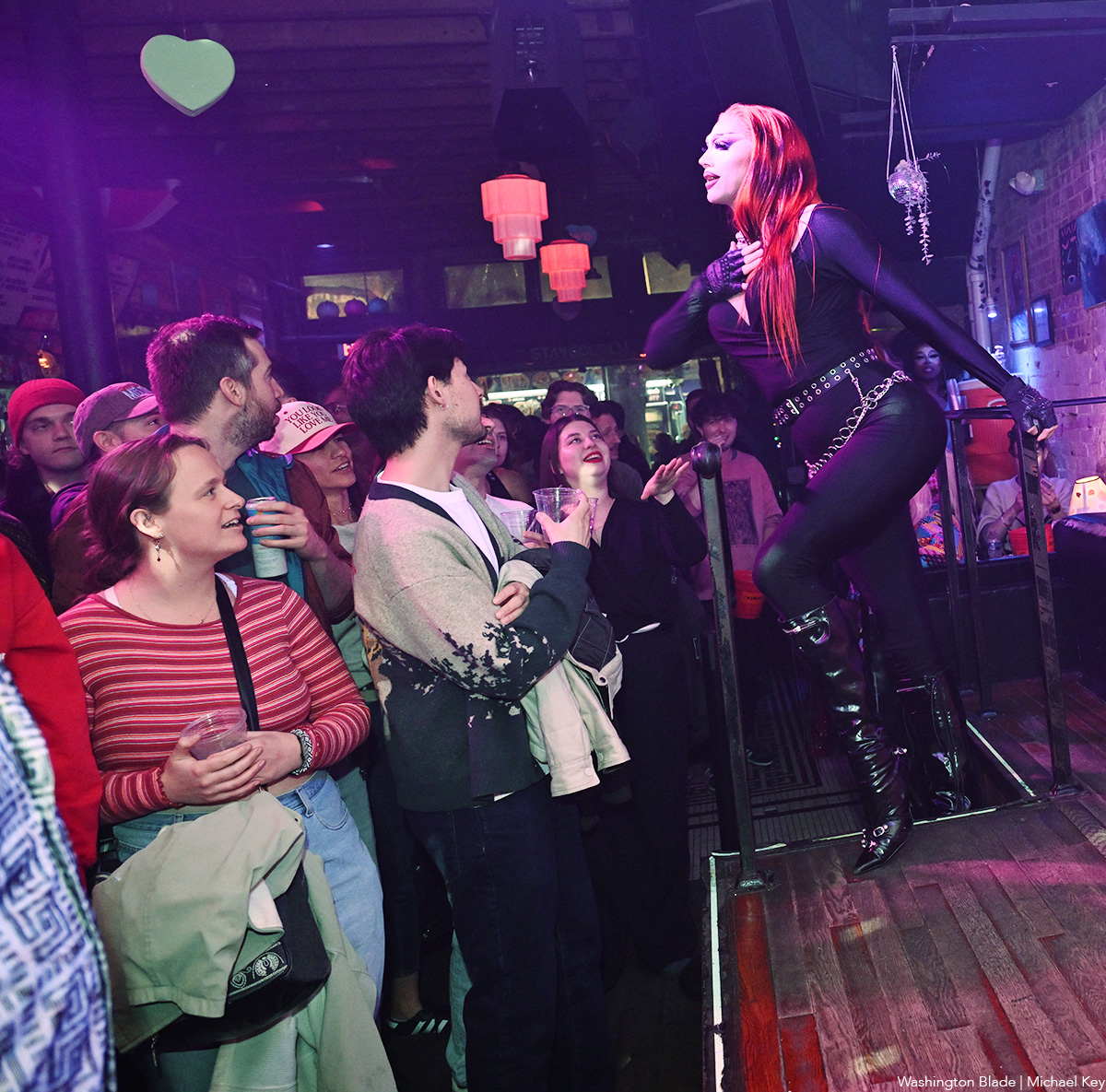
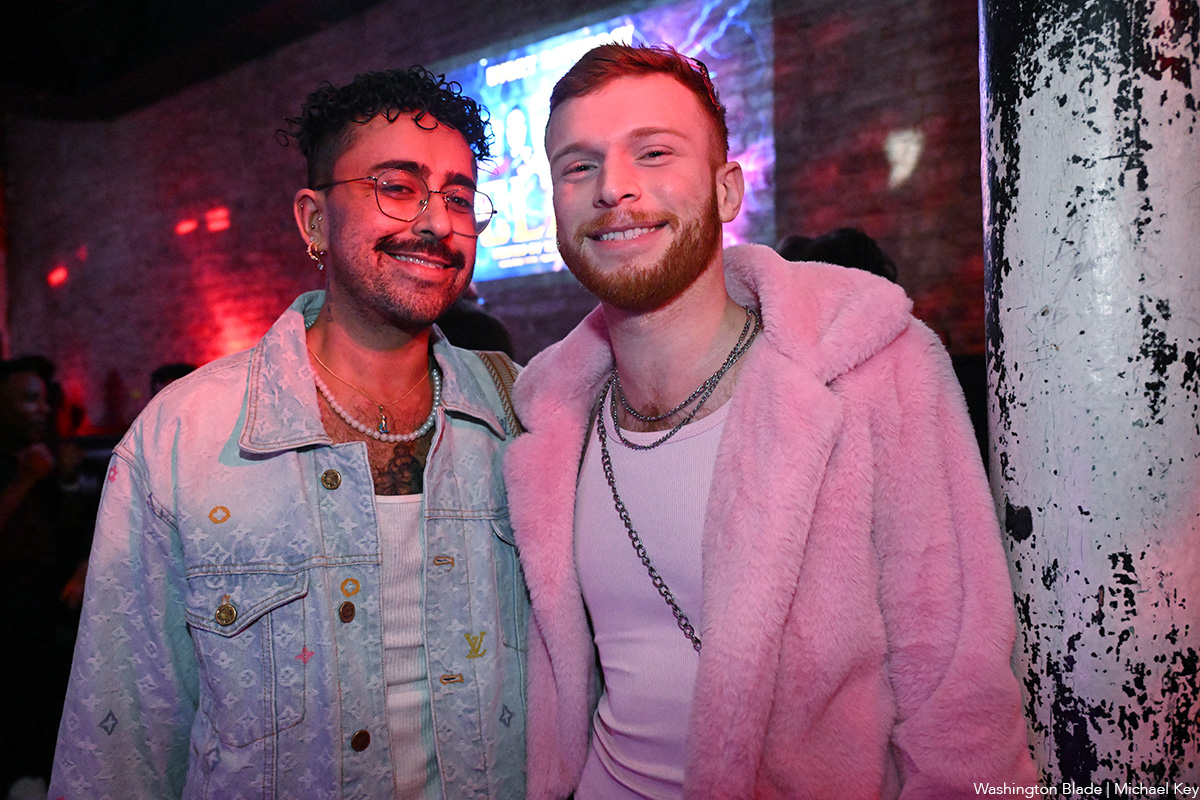
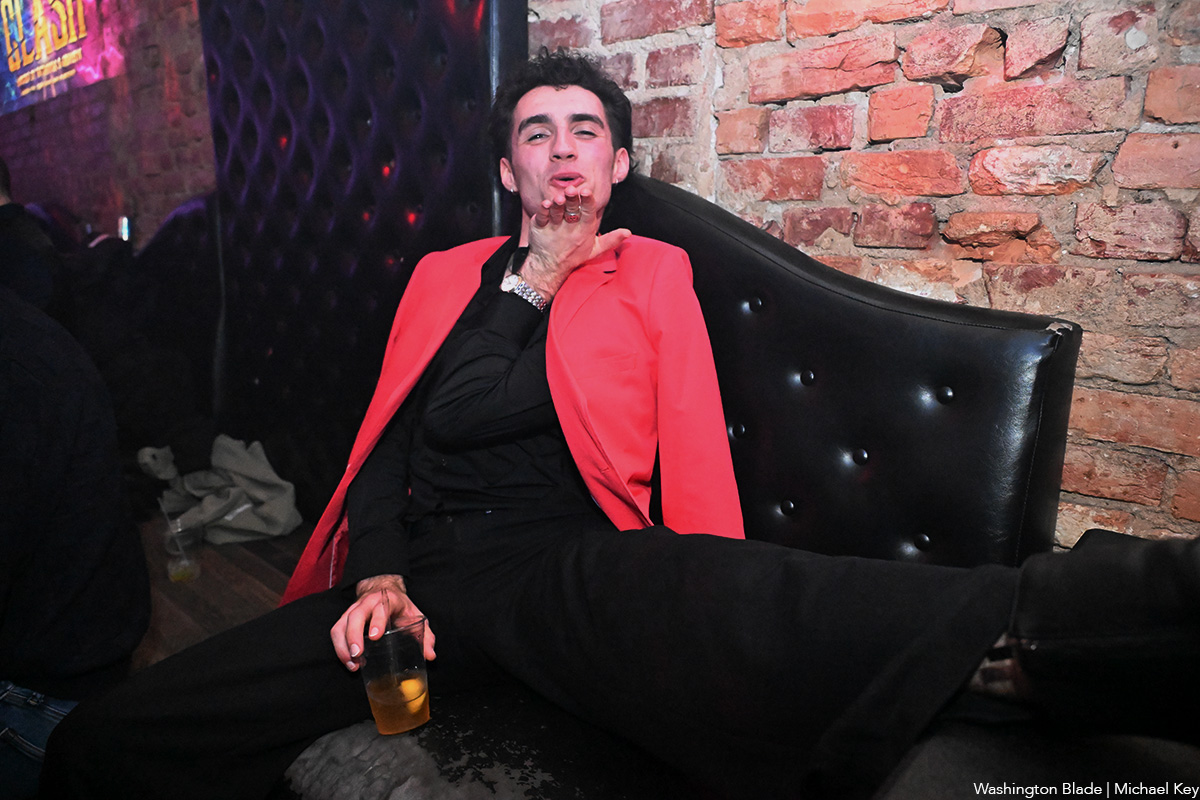
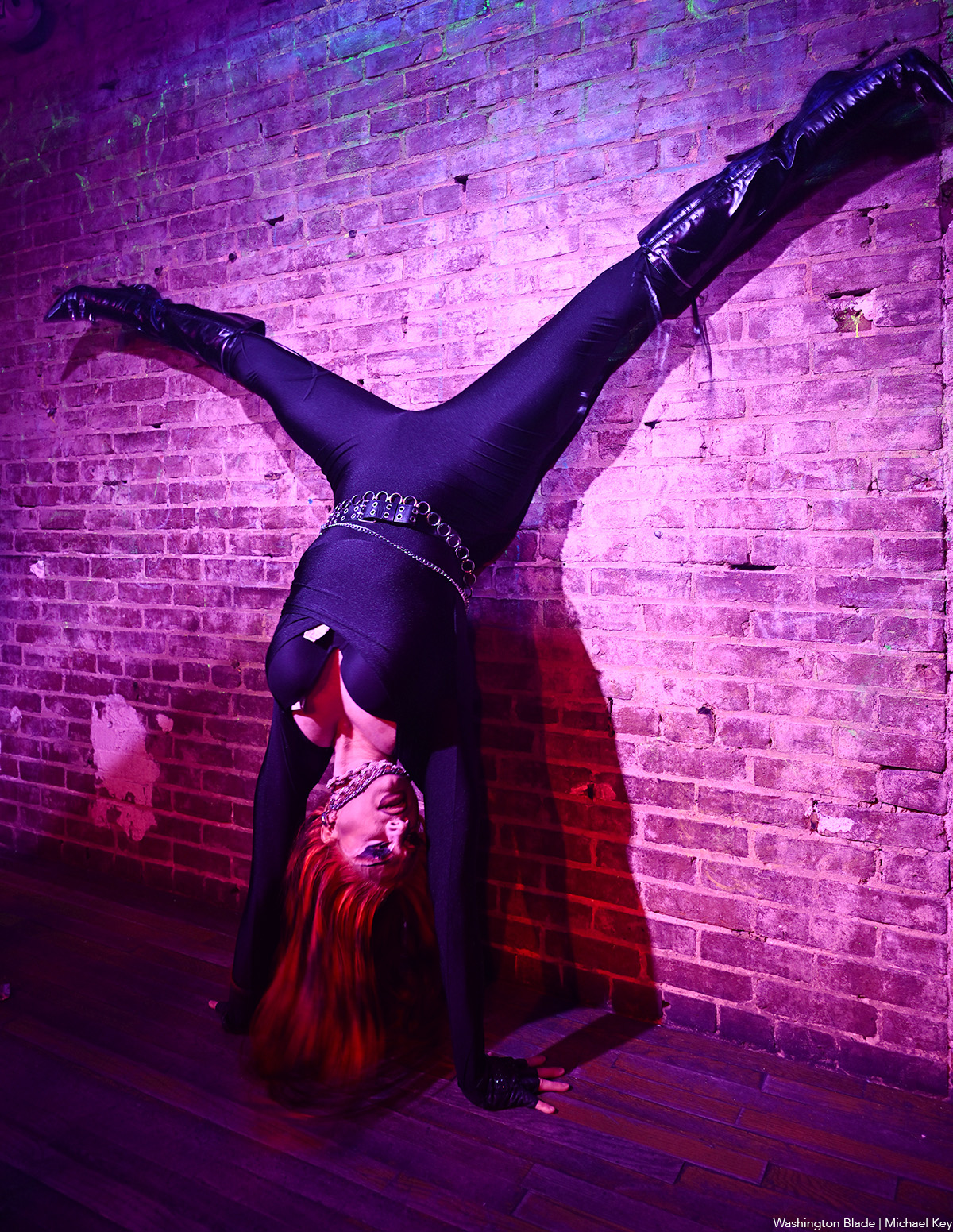
Theater
Magic is happening for Round House’s out stage manager
Carrie Edick talks long hours, intricacies of ‘Nothing Up My Sleeve’

‘Nothing Up My Sleeve’
Through March 15
Round House Theatre
4545 East-West Highway
Bethesda, Md. 20814
Tickets start at $50
Roundhousetheatre.org
Magic is happening for out stage manager Carrie Edick.
Working on Round House Theatre’s production of “Nothing Up My Sleeve,” Edick quickly learned the ways of magicians, their tricks, and all about the code of honor among those who are privy to their secrets.
The trick-filled, one-man show starring master illusionist Dendy and staged by celebrated director Aaron Posner, is part exciting magic act and part deeply personal journey. The new work promises “captivating storytelling, audience interaction, jaw-dropping tricks, and mind-bending surprises.”
Early in rehearsals, there was talk of signing a non-disclosure agreement (NDA) for production assistants. It didn’t happen, and it wasn’t necessary, explains Edick, 26. “By not having an NDA, Dendy shows a lot of trust in us, and that makes me want to keep the secrets even more.
“Magic is Dendy’s livelihood. He’s sharing a lot and trusting a lot; in return we do the best we can to support him and a large part of that includes keeping his secrets.”
As a production assistant (think assistant stage manager), Edick strives to make things move as smoothly as possible. While she acknowledges perfection is impossible and theater is about storytelling, her pursuit of exactness involves countless checklists and triple checks, again and again. Six day weeks and long hours are common. Stage managers are the first to arrive and last to leave.
This season has been a lot about learning, adds Edick. With “The Inheritance” at Round House (a 22-week long contract), she learned how to do a show in rep which meant changing from Part One to Part Two very quickly; “In Clay” at Signature Theatre introduced her to pottery; and now with “Nothing Up My Sleeve,” she’s undergoing a crash course in magic.
She compares her career to a never-ending education: “Stage managers possess a broad skillset and that makes us that much more malleable and ready to attack the next project. With some productions it hurts my heart a little bit to let it go, but usually I’m ready for something new.”
For Edick, theater is community. (Growing up in Maryland, she was a shy kid whose parents signed her up for theater classes.) Now that community is the DMV theater scene and she considers Round House her artistic home. It’s where she works in different capacities, and it’s the venue in which she and actor/playwright Olivia Luzquinos chose to be married in 2024.
Edick came out in middle school around the time of her bat mitzvah. It’s also around the same time she began stage managing. Throughout high school she was the resident stage manager for student productions, and also successfully participated in county and statewide stage management competitions which led to a scholarship at the University of Maryland, Baltimore County (UMBC) where she focused on technical theater studies.
Edick has always been clear about what she wants. At an early age she mapped out a theater trajectory. Her first professional gig was “Tuesdays with Morrie” at Theatre J in 2021. She’s worked consistently ever since.
Stage managing pays the bills but her resume also includes directing and intimacy choreography (a creative and technical process for creating physical and emotional intimacy on stage). She names Pulitzer Prize winning lesbian playwright Paula Vogel among her favorite artists, and places intimacy choreographing Vogel’s “How I learned to Drive” high on the artistic bucket list.
“To me that play is heightened art that has to do with a lot of triggering content that can be made very beautiful while being built to make you feel uncomfortable; it’s what I love about theater.”
For now, “Nothing Up My Sleeve” keeps Edick more than busy: “For one magic trick, we have to set up 100 needles.”
Ultimately, she says “For stage managers, the show should stay the same each night. What changes are audiences and the energy they bring.”

Friday, February 13
Center Aging Monthly Luncheon With Yoga will be at noon at the DC Center for the LGBT Community. Email Mac at [email protected] if you require ASL interpreter assistance, have any dietary restrictions, or questions about this event.
Go Gay DC will host “LGBTQ+ Community Happy Hour Meetup” at 7 p.m. at Freddie’s Beach Bar and Restaurant. This is a chance to relax, make new friends, and enjoy happy hour specials at this classic retro venue. Attendance is free and more details are available on Eventbrite.
Women in their Twenties and Thirties will be at 7 p.m. on Zoom. This is a social discussion group for queer women in the D.C. area. For more details, visit the group on Facebook.
Saturday, February 14
Go Gay DC will host “LGBTQ+ Community Brunch” at 11 a.m. at Freddie’s Beach Bar & Restaurant. This fun weekly event brings the DMV area LGBTQ community, including allies, together for delicious food and conversation. Attendance is free and more details are available on Eventbrite.
The DC Center for the LGBT Community will host a screening of “Love and Pride” at 1:30 p.m. This event is a joy-filled global streaming celebration honoring queer courage, Pride, and the power of love. It’s a bold celebration of courage and community — a fearless reminder of what we’ve overcome, how love is what makes us unstoppable, and how we have always turned fear into fierce. For more details, visit the Center’s website.
Sunday, February 15
LGBTQ+ Community Coffee and Conversation will be at 12 p.m. at As You Are. This event is for people looking to make more friends and meaningful connections in the LGBTQ community. Attendance is free and more details are available on Eventbrite.
Monday, February 16
Queer Book Club will be at 7:00p.m. on Zoom. This month’s read is “Faebound” by Saara El-Arifi. For more details, visit the DC Center’s website.
“Center Aging: Monday Coffee Klatch” will be at 10 a.m. on Zoom. This is a social hour for older LGBTQ+ adults. Guests are encouraged to bring a beverage of choice. For more information, contact Adam ([email protected]).
Tuesday, February 17
Center Bi+ Roundtable will be at 7 p.m. on Zoom. This is an opportunity for people to gather in order to discuss issues related to bisexuality or as Bi individuals in a private setting.Visit Facebook or Meetup for more information.
Wednesday, February 18
Job Club will be at 6 p.m. on Zoom upon request. This is a weekly job support program to help job entrants and seekers, including the long-term unemployed, improve self-confidence, motivation, resilience and productivity for effective job searches and networking — allowing participants to move away from being merely “applicants” toward being “candidates.” For more information, email [email protected] or visit thedccenter.org/careers.
Thursday, February 19
The DC Center’s Fresh Produce Program will be held all day at the DC Center for the LGBT Community. To be fair with who is receiving boxes, the program is moving to a lottery system. People will be informed on Wednesday at 5 p.m. if they are picked to receive a produce box. No proof of residency or income is required. For more information, email [email protected] or call 202-682-2245.
Virtual Yoga Class will be at 7 p.m. on Zoom. This free weekly class is a combination of yoga, breath work and meditation that allows LGBTQ+ community members to continue their healing journey with somatic and mindfulness practices. For more details, visit the DC Center’s website.



